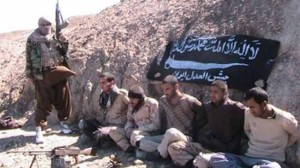 After almost two months of scramble, Jaish al-Adl yesterday announced on its Facebook page that the four abducted Iranian border guards had all been released. In a statement, the group claimed the decision was solely made in response to “the demand of Sunni clerics” and as a sign of the group’s “good intentions and humanitarian motives.” The body of the fifth soldier, who was executed a few days ago, will be handed over to the Iranian authorities soon.
After almost two months of scramble, Jaish al-Adl yesterday announced on its Facebook page that the four abducted Iranian border guards had all been released. In a statement, the group claimed the decision was solely made in response to “the demand of Sunni clerics” and as a sign of the group’s “good intentions and humanitarian motives.” The body of the fifth soldier, who was executed a few days ago, will be handed over to the Iranian authorities soon.
According to media reports, quoting locals in the city of Zahedan, helicopters had been hovering over the city since the early morning, and Molavi Abd al-Hamid, the Sunni Imam of Zahedan, had left the city at dawn, presumably to supervise the release.
Fars News, the Iranian news agency associated with Sepah Pasdaran, was the first Iranian media to report the soldiers’ release. Other Iranian news media followed suit later. They all highlighted the crucial role of Sunni clerics in the agreement. Iranian officials, too, emphasised that the Islamic Republic does not recognise Jaish al-Adl, so there would not have been direct negotiations with them and the soldiers’ release is the result of Sunni clerics attempts only. But this does not seem very accurate.
A few days ago, the governor of Sistan and Balouchestan province revealed that a prisoners exchange deal was about to happen, in which 34 Sunni captives would be released. The news was later strongly denied by the government. Yet other sources claimed that, not only a number of Sunni prisoners have been released, but that Jaish al-Adl has also financially benefited from the deal made with the Iranian government.
EDITOR’S COMMENT:
Iranians were delighted to hear the news of these young soldiers being returned to their families. When human lives are at stake, negotiating and compromising are justifiable. But lying to the public on such crucial matters is not. The lack of transparency and trust between Iranian officials and the Iranian public has allowed Jaish al-Adl to make a gesture of ‘good will’ despite the execution of a young soldier only a few days ago.
Moreover, the last lines of Jaish al-Adl’s statement warns that, if the group’s demands are not met, “this will not be the last action of its kind.” Will the Islamic Republic change the way it treats minorities, including Sunnis, in order to prevent such adversities from recurring? Will the Iranian regime stop its disastrous adventures in the Middle East, be it in Syria, Iraq, Lebanon or elsewhere, to spare its own citizens, as well as those of other countries, unnecessary tragedies?
 English
English  فارسی
فارسی  العربية
العربية 




 On Twitter
On Twitter